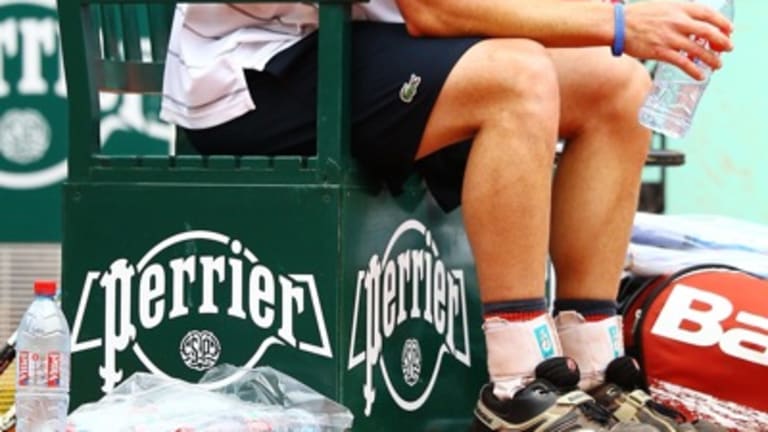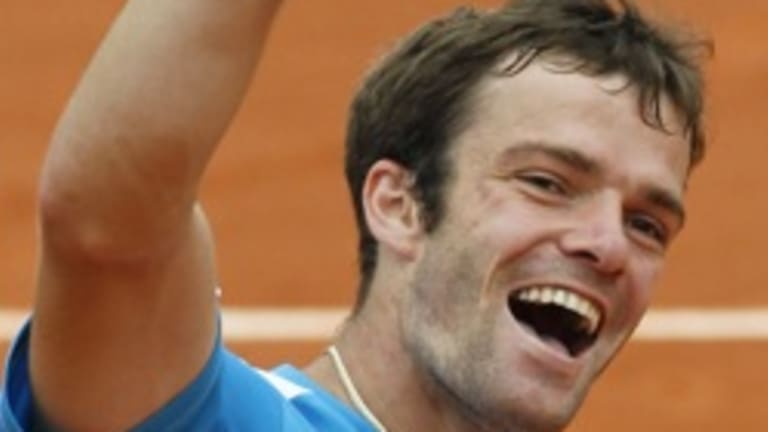“A brown ball? So unprofessional,” Andy Roddick says to chair umpire Carlos Bernades with a sardonic shake of his head. He’s unhappy with the ball he’s just received, which has rolled through a puddle and is now half-covered by a damp spot of muddy clay.
That’s not really the issue, of course. What’s really eating Roddick at the moment is that he’s down 3-5 in the first set to No. 116-ranked Temiuraz Gabashvili out on Court Suzanne Lenglen, where the sky is gray, the air is heavy, and the energy in the building is less than palpable. This is not the start that America’s best player had hoped for, and it’s not the court where he wants to be playing. Roddick has been upset in this same stadium, which many of the players believe has the slowest clay at Roland Garros, numerous times in the past. Off the top of my head I can remember him being beaten in Lenglen by Olivier Mutis in 2004, Jose Acasuso in 2005, and Gael Monfils last year. But what can he do? As Roddick says afterward, he’s not a center court guy in Paris, but he’s not a side-court guy either. “They’re putting me on the court they feel I should be on as far as people coming to see [the match]. It’s nobody’s fault.”
From the start, you can see that Lenglen has cast its dark spell over Roddick once more. Gabashvili may be ranked 116 at the moment, but he’s always a strong ball-striker, with enough pop to hit winners from behind the baseline. In the past, he's been able to hang with better players for short periods of time before coming uncorked. Gabashvili has trouble sustaining his best form for a couple of reasons. One is his emotional control, or lack thereof. After hitting the tape with a makeable passing shot today, he stamped his feet and scrunched his face up like a little boy whose younger sister has just beaten him at Wii. It’s not hard to figure out what the 25-year-old Georgian is thinking and feeling at any given moment. You can see it in his anxious body language and facial expressions. He’s up and down, so much so that it makes him jumpy during matches.
From a more practical perspective, Gabashvili’s problem begins right at the beginning of his strokes. He has long backswings, and it takes him a while to get around to the ball. “The tricky thing for him,” Roddick said today, “is having enough time to take those swings at the ball.” But this isn’t a problem on the slowest court at Roland Garros, and you can see the difference in the pace that Gabashvili can generate when he does make contact, and the pace that Roddick is generating with his much shorter strokes. “My swings are a little bit more compact and more based on timing as opposed to the long, fluid, lengthy-type thing,” Roddick says. “You do that over and over, I’m probably gonna come up short against that in conditions like these.”
It’s a paradox of clay-court tennis that, while it obviously rewards consistency, stamina, and defense, you also must have enough juice from the baseline to put the ball past your opponent. As Roger Federer said after his last match, you have to be able to finish points when you get the opportunity on dirt. When we talk about Americans' struggles on the surface, we typically talk about how we can’t move on the stuff, or that we breed big servers and all-or-nothing attacking players rather than stubborn grinders. But while Roddick is the quintessential big-serving American, otherwise he really is a grinder, a better grinder than ever, in fact, as he proved with his strong showing on slow hard courts this spring. Roddick loses on clay, or at least on clay today, because after the serve he doesn’t hit big enough. He strokes aren't constructed or timed for this stuff.
After Gabashvili won the first set. I expected him to get tight, to let his emotions get the better of him. Roddick hung tenaciously to his serve through the second set, hoping for the same thing. And there was one moment, in Roddick’s first service game, where Gabashvili appeared to hesitate. Pushed out wide, he had a look at a forehand up the line, a shot he’d been drilling without trouble, and he tentatively pushed it wide. But that would turn out to be one of the rare occasions when Roddick pushed him anywhere. Gabashvili was able to hit from on top of the baseline and the middle of the court; a nervous player can’t ask for anything more than that. “The way the points were constructed today,” Roddick said, “I wasn’t on top of anything.”

